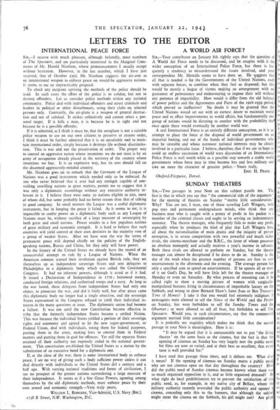SUNDAY THEATRES
C] to pl de
04
L] N; in
Re
re: ho m; en no wl
is
gu
wl
Hi im the wl ag if to an be
ch
wt tel ca
Stn, Two passages in your Note on this subject puzzle me. The first is that in which you say that " the commercial side of the argument" for the opening of theatres on Sunday ".merits little consideration." Why? You are not, I trust, one of those scowling Left Wingers, with pop eyes and permanent undergraduate minds, who think that any business man who is caught with a penny of profit in his pocket is a member of the criminal classes and ought to be serving an indeterminate sentence. The theatre manager, who frequently fails to make any profit, especially when he produces the kind of play that Left Wingers love, all about the nationalisation of main drains and the iniquity of private enterprise, is in severe competition with two powerful and much richer rivals, the cinema-merchant and the B.B.C., the latter of whom possesses an absolute monopoly and actually receives a year's income in advance. Both these rivals are allowed to perform on Sunday, but the theatre manager can almost be decapitated if he dares to do so. Sunday is the day of the week when the greatest number of persons are free to seek entertainment in the afternoon and the evening. The average person has only a specified sum to spend on entertainment. If he spends all or most of it on God's Day, he will have little left for the theatre manager on Monday or even on Saturday. By what process of reasoning can it be called right to show a moving picture of women with surgically- manipulated features living in circumstances of improbable luxury on the Sabbath, and wrong to show Bernard Shaw's Saint loan or Ben Travers's Tons of Money? I take it that you would feel extremely indignant if newsagents were allowed to sell the News of the World and the People on Sunday, but were forbidden to sell the Sunday Times and the Observer ; or were allowed to sell all four, but forbidden to sell The Spectator. Would you, in such circumstances, say that the commercial argument merited little consideration?
It is probably my stupidity which makes me think that the second passage in your Note is meaningless. Here it is: "It may be argued that it is unreasonable not to put 'the living theatre' on the same basis as the cinema, but the fact is that the opening of cinemas on Sunday has very largely met the public need, for films are now so varied, and at their best so excellent, that every taste is well provided for."
I have read that passage three times, and it defeats me. What does it mean? If the opening of cinemas on Sunday meets a public need, why are not cinemas open on that day throughout the country? How did the public need of Sunday cinemas become known when that was so much organised opposition to it, and so little organised demand? By what right do local prohibitionists try to prevent the satisfaction of this public need, as, for example, in my native city of Belfast, where the military authority recently overruled the public authority and opened a cinema, conceding only this to the banners, that although the soldier might enter the cinema on the Sabbath, his girl might not? Are plays
less varied than moving-pictures? Are they, at their best, not excellent? Do they not p.rovide for every taste?
Lastly, Sir, may I point out that while some actors refuse to help their profession to cope with powerful rivals by acting for that base and ignoble thing called profit, they do not disdain the fee they receive from the B.B.C., though it is less than they would demand from a bloated, blood-sucking and accursed capitalist for acting on Sundays? They have been known to solicit engagements in Sunday performances by private societies, at a nominal fee of a guinea, because they hoped that the play might turn out to have a commercial value—tut! tut!—and bring them in great wads of profit. Are we to feel admiration for the player who refuses to be torn from the bosom of his family on Sunday to make profit not only for himself, but for his employer, but to deny it to the same player when he lets himself be wrenched from his family's bosom on that day for the delight of the Stage Society? Actors have usually more leisure than they like. I have known players of distinction to be unemployed for two years. They had, by the end of that time, had as much of their family's bosom as they could bear. The question of salary Fan be settled by Equity. It might best be settled by a flat rate for every performance, instead of a salary, and by the payment of extra money on Sunday. Bear in mind, Sir, that the cinema has the best of the bargain all round. The same film can be produced everywhere simultaneously. It costs nothing to carry from town to town, comparatively speaking, and is neither temperamental nor liable to illness. It can be shown, in normal times, five or six times in a single theatre in a single day, with at least two exhibitions on Sunday. Is it fair; then, to prevent the theatre from earning its living on the most profitable—out, damned word!—day of



























 Previous page
Previous page